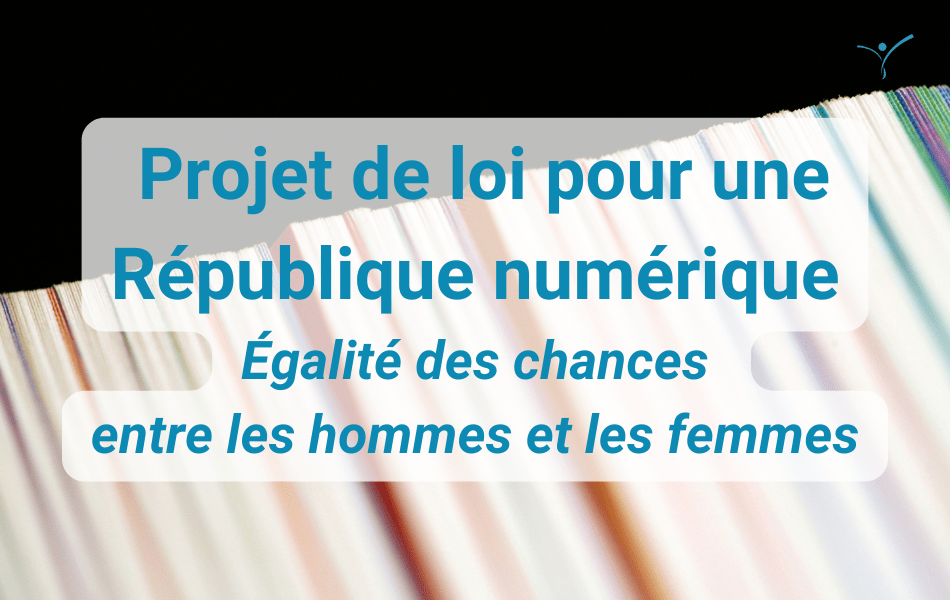Information Report | Bill for a Digital Republic | Equal opportunities for men and women
December 15, 2015 – Digital technology and its uses are at the heart of a profound transformation of society and the economy, affecting all sectors of activity and accounting for around a quarter of French growth (Support for the digital economy and innovation, report by the Inspection générale des finances, 2012).
As emphasized by the Conseil national du numérique (CNNum) (digital ambition. For a French and European digital transition policy, report by the National Digital Council (CNNum), report submitted to the Prime Minister in June 2015), « now more than ever, technophobes and techno-lovers need to be turned on their head, and digital technology needs to be seen for what it is: a factor in major upheavals, to which we need to give meaning, direction and values. The digital society is not a force to be reckoned with, but rather the result of a series of individual and, above all, collective choices ».
We need to fully seize all the opportunities created by the digital revolution, in terms of social and economic progress, and measure and accompany the changes at work – in other words, anticipate so as not to suffer the consequences of technological developments, and design a society in line with its values of freedom, equality and fraternity.
In June 2014, as part of a hearing of the Delegation for Women’s Rights and Equal Opportunities between Men and Women, the importance of these issues had been highlighted by the rapporteurs of the information mission on the French digital economy, Ms Corinne Erhel and Ms Laure de la Raudière, who had conducted important work on this subject for over a year. One of the issues raised was the impact of digital technology on women’s employment.
Following in particular the major national consultation on digital, which resulted in a report submitted to the Prime Minister at the end of the first half of 2015, the delegation wished to reflect further on these issues, questioning the impact of digital transformation from a gender perspective.
In particular, how can we ensure that women take full advantage of this revolution and gain access to quality jobs, when today there are just under 28% of women in digital professions in the broadest sense? What role can the education system play in this? Given that digital technology is leading to the destruction of certain jobs, to what extent are professions in which women predominate particularly affected? In addition to jobs, digital technology is also disrupting the organization and conditions of work, while the need for employees to upgrade their skills as a result of digital technology is considerable. What is the place of women in cyberspace, and how can we prevent and combat sexist and sexual cyber-violence?
More generally, to what extent and under what conditions can digital technology be a “formidable emancipation tool for women”, as mentioned by the Secretary of State for the Digital Sector, Ms Axelle Lemaire (in an interview with Le Figaro Madame, published on March 12, 2015)?
The Delegation appointed its information rapporteur on women and the digital world on October 6, 2015, and subsequently asked to be seized of the draft law for a digital Republic, in accordance with the provisions set out in Ordinance no. 58-1100 of November 17, 1958 on the functioning of parliamentary assemblies, as amended by Law no. 99-585 of July 12, 1999 (under the terms of Article 6 septies of the aforementioned ordinance, “parliamentary delegations for women’s rights and equal opportunities between men and women may be seized of draft or proposed legislation by: the bureau of either assembly, either on its own initiative or at the request of a group chairman; a standing or special committee, on its own initiative or at the request of the delegation. In accordance with these provisions, President Catherine Coutelle wrote to Jean-Jacques Urvoas, chairman of the committee responsible for this bill, requesting that the matter be referred to the delegation.) The purpose of this report is twofold:
– as part of the delegation’s legislative activities: the examination for opinion of the draft law for a digital Republic (no. 3318), which was adopted by the Council of Ministers on December 9, 2015, and more specifically certain provisions on the right to maintain connection for people in difficult financial situations, the strengthening of the openness of public data (open data) and the right to erase data in favor of minors (right to oblivion);
– as part of its mission to inform and evaluate public policy (article 6 septies stipulates that parliamentary delegations for women’s rights “are tasked with informing the assemblies of the policy pursued by the government with regard to its impact on women’s rights and equal opportunities for men and women. In this area, they monitor the application of laws”): the thematic work on women and the digital world was organized around two major issues: women’s education, integration and employment, on the one hand, and their rights and freedoms in the digital age, on the other. Each of these could have been the subject of a separate report, given the breadth and diversity of the issues addressed. In December 2014, the CNNum was asked to conduct a study on digital transformation, employment and work, due to be published in early 2016, while the National Assembly’s Commission de réflexion sur le droit et les libertés à l’âge du numérique, whose report was published in October 2015, carried out in-depth work on these particularly complex issues for a year.
The Women’s Rights Delegation heard around fifteen people, listed in Appendix 1 of this report, during eight hearing sessions, which mainly took place in October and
November 2015 (with the exception of two hearings held in June 2015. The reports are presented in the appendix), alongside other work carried out by the delegation, notably on the 2016 Finance Bill, women and climate disruption and gender equality in Mayotte.
These hearings enabled us to hear highly complementary points of view, with high-quality contributions from representatives of associations such as Duchess France, Girlz in Web and the Centre Hubertine Auclert, as well as lawyers, members of the CNNum, etc. The Secretary of State for Digital Affairs, Axelle Lemaire, was also invited to conclude this work.
In addition, the rapporteur made two field trips – to École 42, founded by Xavier Niel in Paris, and to the Simplon school in Montreuil – and also met with Catherine Bechetti-Bizot, Inspector General of National Education and former Director of Digital Education at the Ministry.
In addition, the rapporteur wished to gather further information, by sending :
– a questionnaire to the Minister of Justice concerning cyber-violence, and in particular certain provisions of the Penal Code and the Civil Code relating to violations of privacy and image rights;
– a questionnaire to the French ambassadors in seven countries (Australia, Canada, Israel, Japan, New Zealand, the United Kingdom and the United States) that had been mentioned during the delegation’s work, on “revenge porn” and other cyber-violences, the replies to which are presented in Appendix 3 of this report.
The delegation examined this report at its meeting on December 15, 2015. It deals with education and the impact of the digital revolution on women’s integration and employment (first part), as well as their rights and freedoms in the digital age (second part), concerning in particular feminist cyberactivism but also sexism and online violence, making 18 recommendations to promote “equality 3.0”, listed below.
I would like to thank all the people interviewed by the delegation and the rapporteur, the Ministry of Justice and the French ambassadors to Canada, Israel, New Zealand and the United Kingdom.
I would like to thank them for their invaluable contribution to the work of the Delegation for Women’s Rights and Equal Opportunities for Men and Women.


